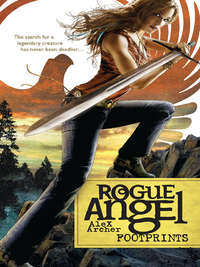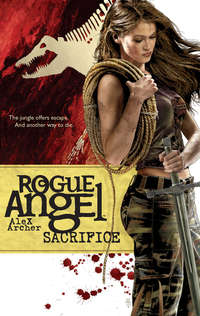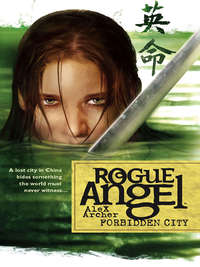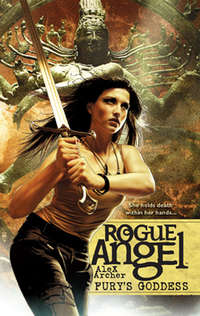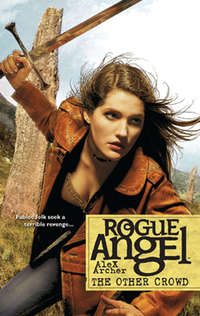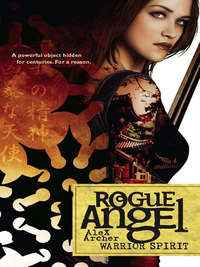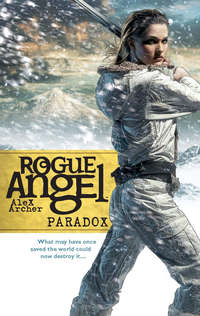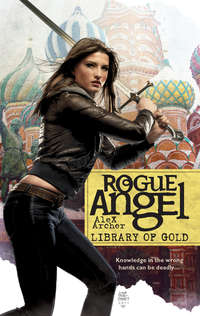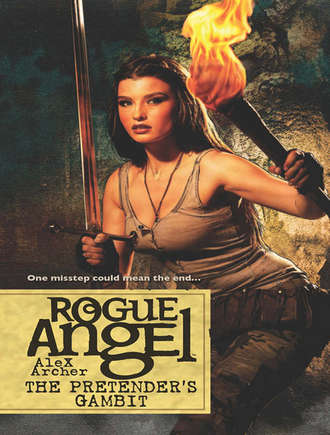
Полная версия
The Pretender's Gambit
The diner was low-key and welcoming, worn and lived-in, filled with lots of younger regulars who worked on tablets or talked on the phone while they ate their breakfast. They wore business attire and were the smallest group in the diner. Most of the clientele was older and spoke in Russian or heavily accented English. They gathered as couples or small groups. All of them looked pensive and distracted, and Annja wouldn’t need a second guess to know what the topic of conversation was.
“Can I get you a refill?”
Annja looked up at the young waitress and nodded. Annja slid over her nearly empty coffee cup, did the same with Bart’s, and told the young woman thanks after she’d poured the fresh-brewed coffee. Annja added cream and sugar to both coffees, turning the hot liquid the color of caramel.
Bart was talking on the phone, listening mostly, and the one-sided conversation didn’t give Annja much to work with. Curiosity grew in her as she waited. Finally, Bart put the phone away and returned his attention to her.
“That was Broadhurst. He says the ME released a prelim based on the scene.”
Through the large plate-glass window behind Bart, Annja could see the reflection of the apartment building across the street. The ME’s long black vehicle had eased into the collection of police cars and crime-scene vans. Morning light filtered through the dregs of the night, bringing a sense of the new day. Traffic had increased, both vehicular and pedestrian. Passersby stopped only briefly to find out what was going on, then they got back to their day. Murder was nothing new in the metro area.
Even though she had seen such casual acceptance of murder and death before, in New York as well as countries around the globe, Annja still refused to think people could just keep moving without being touched by the tragedy.
She put those thoughts away and concentrated on Bart. “What does the ME say?”
“The victim had no defensive wounds. Looks like whoever killed Benyovszky hit him from behind with a hammer, or a similar weapon. The ME won’t commit as to what the weapon was, but she thinks death was instantaneous. At least the old guy didn’t suffer.” Bart picked up his coffee, blew on it and took a sip.
“If the first blow killed Benyovszky, why keep hitting him?”
Bart shook his head. “Anger? Frustration? Maybe fear, if the murderer was afraid Benyovszky would get back up. Don’t know. But whoever did it was thorough.”
“You said there were no defensive wounds?”
“Yeah.” Bart sipped his coffee. “Could mean that Benyovszky knew his murderer. Let the person into the apartment.”
“Then why was the lock shattered?”
Bart frowned. “I don’t have an answer for that one yet. You’re right. If Benyovszky let his killer into the apartment, that person didn’t need to break in.”
“And if the killer had broken in, Benyovszky would have had defensive wounds because he wouldn’t have trusted whoever came through that door.”
“Yeah. That line of thinking leaves us two options.” Bart counted them off on his fingers. “One, whoever killed Benyovszky panicked and left something behind, then had to break back in to get it. Or two, someone else broke into the apartment after Benyovszky was dead.”
“How much time passed between the murder and the discovery of the body?”
“ME says maybe an hour. It’s a tight window, but it’s there.”
Annja considered that, not enjoying the fact that she didn’t have answers, or at least a better idea of what had gone on in that apartment. Including where the elephant statue was and what it meant.
Lying on the table, Bart’s phone began to ring. He picked it up and glanced at the screen. “There’s only one person I almost know in Idaho.” He clicked the phone on. “This is Detective Bart McGilley of the New York City Police Department.” He turned the phone outward and leaned toward Annja.
Annja leaned forward, too.
“This is Charles Prosch. You left a message on my machine, Detective McGilley. Asking me to call you?” The speaker’s voice was old and hoarse, but held a quiet strength in the Western twang. “I don’t usually get phone calls from New York police detectives, and I haven’t been there or the East Coast in years, so you can understand how I’m curious.”
“Yes, sir. I’m calling in regards to a murder that took place last night.” Bart flipped open his notebook and took out his pen. “The victim was Maurice Benyovszky. I’d like to know how you knew him.”
“What happened?”
“Mr. Benyovszky was attacked and killed in his apartment by unknown assailants.”
“I’m sorry to hear that.” Prosch cleared his throat. “I never met Mr. Benyovszky, but he seemed like a nice guy. From what I saw on his site, he did a pretty good business. Why would you single me out from all those people?”
“An auction you were involved in finished last night.”
“The one with the elephant piece.”
“That’s right. Can you tell me about that piece?”
“I’m more of a collector than an expert, Detective. A dabbler, if you will. I buy a few things now and again, keepsakes mostly, of things I saw while I was in the Corps.”
“You were in the Marines.”
“I was. Thirty years. I did a lot of traveling, then I came back to Bonner’s Ferry where I was born and where I buried my parents. You put down roots doing something like that. I got married, but that didn’t take. She couldn’t be the Marine I was, and I don’t blame her for that. I’ve got two daughters out of it who I love, a handful of grandkids.”
Annja smiled at that. Prosch’s offspring sounded a lot closer than Benyovszky’s hand-me-down nephews. She felt a chill as the door opened and took a sip of her coffee to warm up.
“What do you know about the elephant?” Bart frowned and looked a little frustrated.
“Like I said, not much,” Prosch replied. “It’s an elephant. Looks Asian, if I’m any judge, and I could be just as wrong as I am right.”
“What’s it made of?” Bart consulted the sheet that had been printed out regarding the piece.
“Mr. Benyovszky wasn’t sure, but it looked like sandstone to me. I spent some time in Laos. As I recall, they did a lot of carving in sandstone in that area.”
“You paid a lot of money for an elephant made of sandstone.”
Prosch laughed good-naturedly. “Actually, I wasn’t going to spend that much, but I got caught up in a bidding war.”
Bart wrote that down and underlined it. “A bidding war?”
“Yeah. The other guy who wanted the elephant kept jumping my bid by a dollar. Just enough to edge me out. Kind of irritated me, and I’d talked to Mr. Benyovszky on the phone once when I called to ask him about the piece. He seemed on the up and up. So I figured I’d keep in the bidding game as long as I could, kind of drive up the price for him. Help him out. The other guy seems like he has plenty of money.”
“Do you know who the other guy is?”
“Sure. I looked him up after Mr. Benyovszky mentioned him. He’s a fella named Fernando Sequeira.”
Glancing up, Bart cocked an eyebrow at Annja.
She shook her head and mouthed, I don’t know him. But she turned her attention to her tablet PC and started looking the man up. She got a hit immediately. Fernando Sequeira was a successful businessman in Lisbon, Portugal. Scanning the links that turned up in her search, Annja also discovered that Sequeira was an amateur historian, an interest he had gotten from his grandfather.
Link me, Bart mouthed.
Annja sent the page address to Bart’s phone. While Bart continued talking, Annja searched for Sequeira’s name linked with “elephant” but didn’t pull up anything that seemed to fit with Bart’s case.
“Tell you the truth,” Prosch went on with a touch of chagrin, “I was surprised I won that elephant. I thought that Sequeira fella would swoop in at the last minute and take it. I musta waited twenty minutes for that to happen. When it didn’t, I realized I paid a lot more for that elephant than I had counted on.”
“What did you do after the sale closed?” Bart asked.
“Poured myself three fingers of whiskey, promised myself I wouldn’t stick my neck out like that again and figured I’d get hold of this Sequeira fella and see if I couldn’t get most of my money back. He was interested up to a point.” Prosch paused and his voice turned a little harder. “Unless Mr. Benyovszky and this Sequeira fella were working together to set me up. That what happened?”
“I don’t know, Mr. Prosch. For right now, I’d hang on to your money. Nobody seems to know where that elephant is.”
“Is that so? Well, now that does make a body curious, don’t it?”
Bart grinned. “It does indeed. Hang on to my number if you will, Mr. Prosch.”
“Oh, trust me, I will, Detective.”
“I’ll call back if I have any more questions, and if something turns up on your end, I’d appreciate hearing from you.”
“You will. Count on it.”
Bart broke the connection, laid his phone on the table and glared at it. “So I got a guy out in the wilds of Idaho who hasn’t been to New York in years, and I got a guy in Lisbon, Portugal, who were both interested in that elephant.” He wiped a hand over his mouth and smothered a yawn, but his eyes still glowed with bright interest. “How many others were bidding on that thing?”
Annja checked the list. “Eight people.”
“But they all bailed early.”
“They did.”
“And we still haven’t found the thing.” Bart knotted his hand. “I hate mysteries.” He looked up at her. “I know you enjoy them, but I could live without them. Give me a case where I catch a perp red-handed and just have to fill out the paperwork. Those are the investigations I like.”
Annja knew that wasn’t true. Bart McGilley was clever and knowledgeable. Those were things that underpinned their friendship. They loved puzzles and mystery shows. She didn’t offer to argue the point at the moment.
An Asian man entered from the street and the way he didn’t fit in caught Annja’s attention immediately. Bart tilted his head slightly, shifting his gaze to the man, as well.
The man wore a dark gray suit and a long jacket. On his head he had a black woolen cap. A shade under six feet tall, he looked thin for his size, but his shoulders were broad and he moved with economical grace as he strode toward their table.
Bart shifted slightly so that he could get to his service weapon more quickly, but the nonchalant look on his face never waned.
The Asian man stopped a few feet short of their table, just out of arm’s reach, and smiled slightly at them. “Good morning. I do not mean to trouble you.” His accent held a note of British English in it. “My name is Nguyen Rao. I have come about the elephant Mr. Benyovszky had for sale on his website. Do you have the elephant?”
Chapter 6
Feeling nervous and out of place, Rao smiled at the man and woman seated at the table in front of him. Neither of them appeared to be surprised to see him, and that was good. Nervous people could sometimes make quick mistakes that would bring misfortune to all concerned.
The man broadcasted his profession in his narrowed eyes and readiness for physical confrontation. The move to access the pistol belted at his hip had not gone unnoticed. Rao had seen plenty of policemen during his journeys across Europe and throughout Asia. Criminals and policemen could be confusing, though, because both of them were similar in nature. Rao had dealt with criminals, as well. He much preferred dealing with neither and instead working on his studies.
The woman, though, was similar in some ways, but different in others. She did not seem like a policeman or a criminal because she was more open, more accepting and not shut down. Her curiosity about him showed in the glint of her eyes and the set of her lips. But she kept herself balanced and ready all the same. Composed for confrontation, yes, but she was more curious than cautious. In many, that would be a weakness. Rao was not certain that such motivation was a weakness in her.
He knew of her and of her work. Anyone who labored in the field of antiquities might possibly know her name and her face. The television show rendered her familiar to a great number of the populace, but such familiarity also took away remembrance of her work as an archaeologist.
The policeman spoke first. “What did you say your name was?”
The ploy allowed the man to think a little longer, or perhaps it was only so the microphone of the recording device he wore might pick up his name better.
“Nguyen Rao.”
“I’m Detective McGilley of the New York Police Department.” The detective smiled a little, and the effort was almost guileless. His face was placid as a lake in a dead calm, but his body language was tight. Rao had learned to read both while in the temple.
“It is good to meet you, Detective McGilley.”
McGilley didn’t offer to introduce Annja Creed. “What are you doing here?”
“I came about the elephant.”
“You’re not from around here.”
“No.” Rao made himself endure the inane questions. He knew they would be coming and he had prepared himself to deal with them.
“Where are you from?”
“Phnom Penh.”
McGilley’s eyes cut to Annja Creed for just a moment.
Rao spoke again to remove the confusion and lack of knowledge. “Phnom Penh is in Cambodia.”
McGilley smiled a little at that. “Cambodia’s a long way off, Mr. Nguyen.”
“It is.” Rao thought being agreeable would be best. “The trip by plane required many hours.”
“I’m sure it did. When did you get to New York?”
There was almost no suspicion in the man’s words to touch the ear, but Rao knew the focus that drove the question. “Too late to save Mr. Benyovszky.”
“To save him?”
“Your inference was that I had killed him,” Rao said politely. “I did not. Had I gotten to him in time last night, or this morning—I must admit to some confusion regarding the time, I might have saved him.”
The cop surfaced in McGilley then, and Rao knew that the conversation was going to go badly. Still, he knew he had to try to convince the American that he was in no way responsible for Benyovszky’s death.
“You knew that Benyovszky was going to be killed?”
“No. Had I known that, I would have notified authorities. I was not there. Mr. Benyovszky was. If he felt he was in no danger, then why would I have thought so?”
“You said if you had reached him earlier he might not be dead.”
“I misspoke. It could just as well have been that both of us were killed. I choose to think that his death might have been prevented. But that is already in the past and we must work on the future.”
“Do you know who killed Benyovszky?”
“No.”
McGilley looked around, noticing then that nearby patrons were starting to pay attention. He returned his attention to Rao. “Perhaps we can talk about this somewhere else.” He slid out of the booth and stood, and the woman closed her computer, tucked it away in a messenger bag and slid out of the booth, as well.
“I can save us some time,” Rao offered, thinking that maybe the direct approach—though the most honest—was not working in this instance. “I only need the elephant.”
“We can talk about that outside.” McGilley waved toward the door and indicated Rao should precede him.
Thinking that maybe he was wasting his time, that the elephant had already been lost, probably taken by the man or men who killed Maurice Benyovszky, Rao felt disappointed and turned his thoughts to getting out of police custody, for he felt certain that was where he was headed. He turned and started for the door, then he spotted one of the Portuguese men he’d encountered weeks before.
The man stood at the counter next to the side door and nursed a coffee or a hot tea. No one else was around him.
Rao did not know the man’s name, but there was no mistaking that cruel look or those dead eyes.
* * *
UNTIL THE MONK started to walk out with the police detective and Annja Creed, Calapez thought he had the situation in hand. The fact that the monk was there let Calapez know that the Asian didn’t have the elephant. Evidently the piece was still in play.
However, when recognition flared in the monk’s eyes, Calapez felt threatened and reacted instantly because he preferred the element of surprise to be one of his weapons rather than someone else’s. He pushed away from the counter and swept his coat back, reaching for his pistol.
The detective, focusing on the Asian, was slow getting to his own weapon. Calapez had the 9mm out and started firing, aiming for the detective because he knew the American would have a weapon and the monk and the woman probably didn’t.
Calapez squeezed the rounds off as quickly as he could, putting all three of them into the center of the detective’s chest. The American went back and down, the pistol tumbling from his fingers. The woman dropped down beside him, concern tightening her features.
The monk came toward Calapez so quick that Calapez couldn’t bring his pistol around fast enough to center his weapon on the man. It didn’t matter, though, because one of the men Calapez had stationed outside stepped through the door and raised a machine pistol, spraying bullets indiscriminately.
* * *
SEEING THE MACHINE pistol in the other man’s hands as he entered the diner and knowing that continuing to stay inside the building would only be endangering the rest of the patrons, Rao abandoned his forward momentum and threw himself over the counter. As he landed on fingers and toes, he swept out his left leg, caught the legs of the man tending the grill, and knocked him down as well, so the machine pistol’s bullets cut the air where he’d been, instead of tearing through flesh.
The man sprawled in shock and decided to lie there, still clutching the spatula he’d been using. He mumbled, curses or prayers, Rao couldn’t tell over the yammering machine pistol. Bullets hammered the stainless-steel grill vent and cored through the tile wall, spilling ceramic fragments over the floor.
Rao ran, staying low behind the counter, knowing that his opponents would seek to find him because they had recognized him as a familiar threat even if they didn’t know what he truly represented.
Hoping that his departure would draw his enemies away from the diner, Rao slid around the end of the counter and angled for the door. Bullets chased him, cutting through the air just inches behind him. Thankfully the patrons were down on the floor and out of the way.
He hit the door with both palms, spreading the impact so that the glass door shattered. He ran through the falling fragments and out into the street, thinking that the Portuguese man would have set up his cronies at that door, as well. He just managed to stay ahead of a swath of bullets from the two gunmen standing outside the wrecked door.
Traffic had been held up by a red light at the intersection. At the sound of the shots, the drivers panicked and began trying to pull around each other. Failing that, many of them got out and ran or stayed in their vehicles.
Rao ran, his head low, and knew that the gunmen pursued him.
* * *
ANNJA FELT THE shock of adrenaline hitting her system, but concentrated on examining Bart. He’d been hit by the man’s bullets. That was all she knew.
She reached for him, gazing at his chest and expecting it to be a bloody ruin. It wasn’t. Three bullet holes showed in his shirt, one of them piercing his coat as well, but there was no blood.
Vest, Annja thought frantically. He’s wearing a protective vest.
Then she was aware of the swarthy man beside her. He grabbed her roughly by one elbow and shoved the hot barrel of the pistol against her neck. The barrel was so hot that her flesh seared. She almost fought back, but she knew that would only fail. All the man had to do was squeeze the trigger and the fight would end before it started.
“Move,” the man ordered in a harsh voice.
Annja stood, looking down at Bart. His eyelids flickered, but he was almost unconscious, barely aware of what was going on around him. Even with the vest, his ribs could have been cracked. One of them might have punctured a lung.
The man yanked her again, guiding her toward the back door. Annja knew she had a chance to escape then. The man wasn’t paying strict attention to her. He didn’t know what she was capable of.
But there were too many people around. The innocents would get hurt. She didn’t want that. She held herself ready and waited.
Through the door, outside in the cold air of morning, horns blaring at the traffic jam that had taken shape in the intersection, Annja strode down the sidewalk as the man guided her. They were walking away from the building where Maurice Benyovszky had been killed, walking past the other door to the diner now.
Police would arrive quickly. She knew that. She concentrated on her breathing, keeping it smooth and regular, and she paid attention. There had been two men inside the diner, the guy who held her captive and the man who followed them that had wielded the machine pistol.
The Asian man had vanished, but the two armed men sprinting through the stalled traffic gave Annja a good idea which way Nguyen Rao had gone.
If that’s even his name. Anger flared up in Annja then. She wasn’t sure who to blame for Bart getting shot. From the way the guy who was holding on to her had acted, he’d chosen to shoot Bart as soon as Bart had tried to leave with the Asian man.
They definitely weren’t working together. The Asian man had been asking about the elephant piece, but that didn’t mean the guy holding on to her was interested in that.
“Annja Creed,” the man said in that hard voice as he looked around.
She didn’t respond.
Angrily, the man shook her. “You will speak when I speak to you.”
“All right.” Annja took note of the neighborhood. Pedestrians had been drawn to the diner, thinning out of the alley and the streets. The smart neighbors and passersby stayed in their homes and watched.
“Where is the elephant?”
Okay, so all of this is connected. Everybody has an elephant on their agenda. Annja took a breath and stepped off the curb, keeping pace with the man at her side. “I don’t know.”
“Does the detective have it?”
“No. The elephant wasn’t in Benyovszky’s apartment.”
The man cursed in Portuguese. Annja understood enough of the man’s invective to understand he was mad and scared.
“What is the elephant?” Annja asked.
“None of your business. If you do not know, it is better that you do not learn.”
Annja kept walking, but she was aware that the man was no longer as focused on her. He was looking for a way out now, a way through the police net that would be going up even as they were speaking.
“Maybe I can help,” she suggested. “Just tell me why you’re looking for the elephant and maybe I’d be able to figure out where it is.”
“No.” The man shook her again and kept walking, glancing at the street. “Who killed Benyovszky?”
“I don’t know. You didn’t kill him?”
“The old man was dead when we got there.” Realizing what he had just done, how he had admitted more than he’d intended, the man cursed in Portuguese again.
“There.” The man carrying the machine pistol under his coat pointed to a sedan sailing swiftly down the street. He stepped toward the curb and started flagging the vehicle down.
She didn’t want to get into the car with the men—escape would be harder there if not impossible. Annja lifted her right leg and drove her foot into the back of her abductor’s knee, tripping him and forcing him down at the same time. She caught his gun hand in her hands and twisted. The man released the pistol with a cry of pain just before his wrist bones shattered. He fell away, dropping to the sidewalk.
The man with the machine pistol wheeled around and started bringing his weapon from under his coat.
Knowing she wouldn’t reach the other man in time to prevent him from employing the machine pistol, Annja reached into the otherwhere and grabbed the handle of the sword that had once belonged to Joan of Arc. In less than an eyeblink, it was in this world with her, a piece of her just as surely as any of her limbs.


